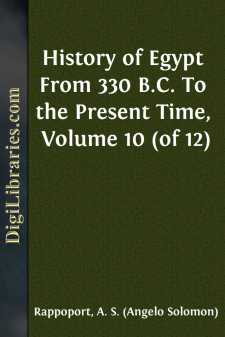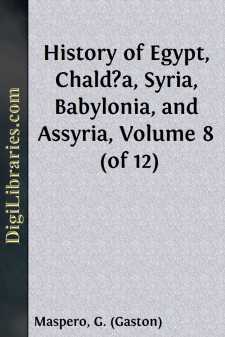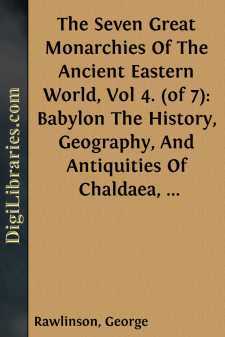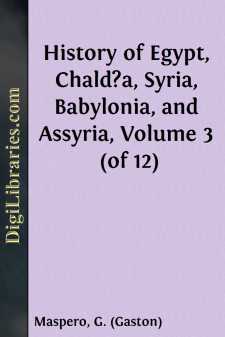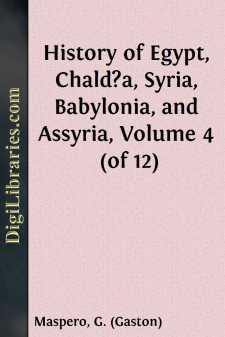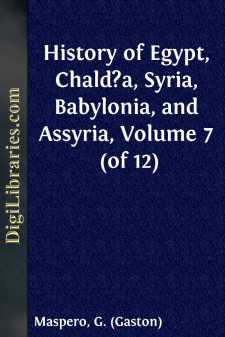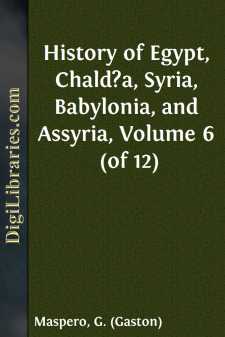History
- Africa 30
- Americas (North Central South West Indies) 50
- Ancient
- Asia 58
- Australia & New Zealand 8
- Canada 41
- Caribbean & West Indies 1
- Civilization 20
- Eastern Europe 12
- Europe 310
- Expeditions & Discoveries 60
- General 77
- Historical Geography 1
- Jewish 9
- Latin America 3
- Medieval 8
- Middle East 14
- Military 248
- Revolutionary 8
- Study & Teaching 5
- United States 353
- Western Europe 56
- World 13
Ancient Books
Sort by:
INTRODUCTORY ESSAYHELLENISM AND HEBRÆISM IN EGYPT UNDER THE PTOLEMIESI.When Alexander the Great bridged the gulf dividing Occident and Orient, the Greeks had attained to a state of maturity in the development of their national art and literature. Greek culture and civilisation, passing beyond the boundaries of their national domain, crossed this bridge and spread over the Asiatic world. To perpetuate...
more...
MESOPOTAMIA.—THE MOUNDS.—THE FIRST SEARCHERS. 1. In or about the year before Christ 606, Nineveh, the great city, was destroyed. For many hundred years had she stood in arrogant splendor, her palaces towering above the Tigris and mirrored in its swift waters; army after army had gone forth from her gates and returned laden with the spoils of conquered countries; her monarchs had ridden to the high...
more...
CHAPTER I—SENNACHERIB (705-681 B.C.) The struggle of Sennacherib with Judæa and Egypt—Destruction of Babylon. Sennacherib either failed to inherit his father's good fortune, or lacked his ability.* He was not deficient in military genius, nor in the energy necessary to withstand the various enemies who rose against him at widely removed points of his frontier, but he had neither the...
more...
by:
George Long
PREFACE. Perhaps some may question the wisdom of putting out the Thoughts of Marcus Aurelius Antoninus to be used as a Reader by children in the schools. It may appear to them better suited to the mature mind. The principle, however, that has governed us in selecting reading for the young has been to secure the best that we could find in all ages for grown-up people. The milk and water diet provided...
more...
by:
George Rawlinson
CHAPTER I. EXTENT OF THE EMPIRE. "Behold, a tree in the midst of the earth, and the height thereof was great; the tree grew and was strong: and the height thereof reached unto heaven, and the sight thereof to the end of all the earth."—Dan. iy. 10, 11. The limits of Babylonia Proper, the tract in which the dominant power of the Fourth Monarchy had its abode, being almost identical with those...
more...
CHAPTER I—ANCIENT CHALDÆA The Creation, the Deluge, the history of the gods—The country, its cities its inhabitants, its early dynasties. "In the time when nothing which was called heaven existed above, and when nothing below had as yet received the name of earth,* Apsu, the Ocean, who first was their father, and Chaos-Tiâmat, who gave birth to them all, mingled their waters in one, reeds...
more...
CHAPTER I THE FIRST CHALDÆAN EMPIRE AND THE HYKSÔS IN EGYPT Syria: the part played by it in the ancient world—Babylon and the first Chaldæan empire—The dominion of the Hyksôs: Âhmosis. Some countries seem destined from their origin to become the battle-fields of the contending nations which environ them. Into such regions, and to their cost, neighbouring peoples come from century to century to...
more...
I.--The Nile and Egypt A long, low, level shore, scarcely rising above the sea, a chain of vaguely defined and ever-shifting lakes and marshes, then the triangular plain beyond, whose apex is thrust thirty leagues into the land--this, the Delta of Egypt, has gradually been acquired from the sea, and is, as it were, the gift of the Nile. Where the Delta ends, Egypt proper begins. It is only a strip of...
more...
CHAPTER I—THE ASSYRIAN REVIVAL AND THE STRUGGLE FOR SYRIA Assur-nazir-pal (885-860) and Shalmaneser III. (860-825)—The kingdom of Urartu and its conquering princes: Menuas and Argistis. Assyria was the first to reappear on the scene of action. Less hampered by an ancient past than Egypt and Chaldæa, she was the sooner able to recover her strength after any disastrous crisis, and to assume again...
more...
CHAPTER I—THE CLOSE OF THE THEBAN EMPIRE—(continued) Ramses III.: Manners and Customs—Population—The predominance of Amon and his high priests. Opposite the Thebes of the living, Khafîtnîbûs, the Thebes of the dead, had gone on increasing in a remarkably rapid manner. It continued to extend in the south-western direction from the heroic period of the XVIIIth dynasty onwards, and all the...
more...


